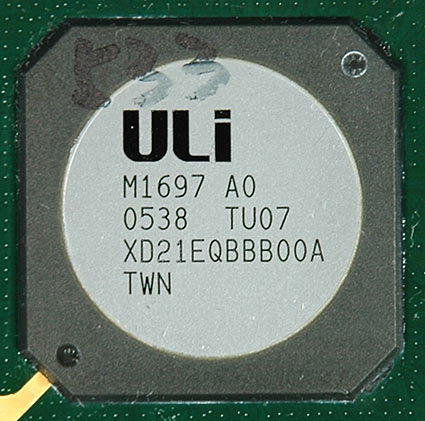The M1697 Concludes The ULi Portfolio
Is ULi Worth Its Price?
$52 million: This is the sum that NVIDIA forked out to acquire Taiwan-based core logic maker ULi. While NVIDIA says that it requires more engineers to make its chipset ambitions come true, the acquisition might be at least as much about establishing a serious budget chipset portfolio for NVIDIA. Either way, we have enough reason to have a look at ULi's current Athlon 64 product. It not only comes at a reasonable price point, but also helps us understand which way SLI may soon be headed.
ULi released its M1695 chipset only a couple of months ago, which still is the only bottleneck-free AMD chipset that supports both PCI Express and AGP 8X; this makes it is an ideal choice for upgrade users. Since the M1695 is laid out as a so-called "HyperTransport tunnel", motherboard makers could link two of them in order to provide more PCI Express connectivity. This could be used for multi-display setups, or for Multi-GPU SLI. Unfortunately, ULi was not even remotely capable of turning this flexibility into a competitive advantage; NVIDIA's verdant aura could certainly do so.
The M1697 is a single-chip core logic product for current and future AMD platforms - all that is needed is support for HyperTransport 2.0 - while the recent M1695 is a two-chip solution. Traditionally, ULi has always tried to implement all the must-have features into a one-chip solution for cost reasons: Producing, packaging, shipping and surface-mounting one rather than two chips is just the most cost-effective way to go. The M1689 (Athlon 64 and AGP) and M1647 (Socket A) were good examples.
With the M1697 at their disposal, motherboard makers have the possibility of using the daisy-chaining option to add a M1695 to high-end products. This would result in a total of 32 PCI Express lanes using the current silicon generation. These lanes could be split into two fully-featured x16 slots or four x8-powered x16 slots. Now please try to imagine what you could do in a Multi-GPU, SLI-enabled system... but ULi is not NVIDIA yet, which means that none of the current ULi-based motherboards will carry the SLI certificate any time soon. At the same time, we don't expect NVIDIA to release SLI support for ULi solutions after completing the acquisition, because anybody with a sense for business would rather try to make sure new products can be sold.
Get Tom's Hardware's best news and in-depth reviews, straight to your inbox.

Patrick Schmid was the editor-in-chief for Tom's Hardware from 2005 to 2006. He wrote numerous articles on a wide range of hardware topics, including storage, CPUs, and system builds.
